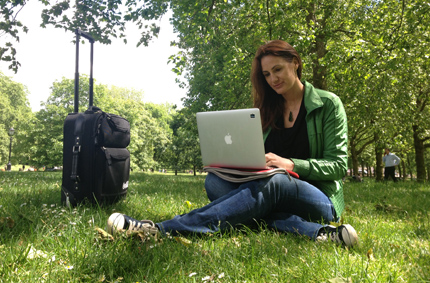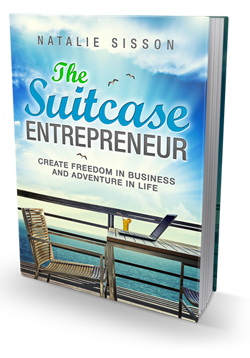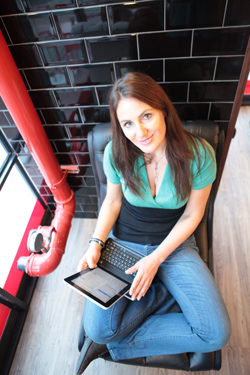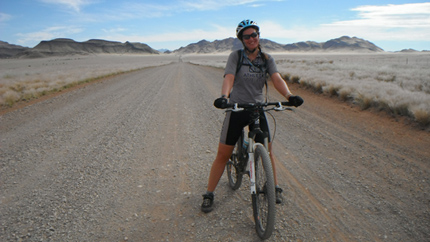
In recent years the term ‘digital nomad’ has become a buzzword for a new way of living and working – travelling the globe with a laptop and living in a succession of exotic countries, all the while running a business from the road.
Plenty of hype and myths have grown up around the subject. One suspects there may even be a few armchair nomads. But there are people out there walking (and flying) the walk – and Natalie Sisson is one of them.
I ‘met’ Natalie online several years ago via our blogs. Whenever I hear from her it’s rarely from the same place twice: Buenos Aires, Paris, Tokyo. Even cycling across Africa. The one constant is Natalie’s enthusiasm – for travel, entrepreneurship and life.
And I’ve seen her reputation and business grow, as she inspires and helps others take to the sky through her speaking, coaching, training and products. She shares her journey, and the lessons learned along the way, in her Amazon No.1 best selling book, The Suitcase Entrepreneur.
Last week we finally met up in person, over coffee in London. I took the opportunity to ask her some questions on your behalf, about the opportunities and pitfalls of life as a Suitcase Entrepreneur.
If you’re remotely interested in creating this kind of life and business for yourself (and even your family!) I’m sure you’ll find this interview worth your while. And if you want to learn more, I recommend Natalie’s book, it’s a mind-boggling read.
Let’s start with the basics. What is a digital nomad? And why might I want to become one?

Living one’s life that way sounds pretty damn appealing to almost everyone I speak to. That’s because, what we’re really talking about here is having more freedom – both personally and financially. It’s about living life on your own terms and creating a business or freelance career around what you love doing, are good at and what people will pay you for – and doing that from anywhere in the world, if you choose to.
What kind of people are best – and least! – suited to the suitcase entrepreneur lifestyle?
Well despite what I just said above, it isn’t always sunshine and roses, although I personally feel so grateful for the life and business I’ve built from my suitcase and world adventures. There’s a lot to consider as to whether you’re cut out to be a suitcase entrepreneur.
It’s certainly not for homebodies, or for people who like their creature comforts and don’t like to be challenged on a weekly, if not daily basis.
It’s great for those who have an adventurous and independent nature, are curious about the world and different cultures and who are quite capable of motivating themselves and creating routine in a non-routine lifestyle.
Many would argue being location independent suits single people without family or a care in the world, but that’s simply not the case, and in my book I profile the whole gamut of people from singles, to couples with dogs and families. What all of these people have in common is a desire to live life on their own terms, no matter what.
But … it’s not always fun to sit in airports, go on long train journeys, be in noisy cafes with dodgy internet or pack up your suitcase for the umpteenth time. It can get lonely on the road, too.
It’s important that you know what you’re signing up for to lead this Suitcase Entrepreneur lifestyle (and that of an entrepreneur in general), so take a look at this list below and see if it’s a really a good fit for you:
Checklist of key qualities and characteristics you need:
- A vision for your business and life that you will fight for
- A strong sense of purpose and what’s important to you
- Determination, persistence and the ability to hustle
- Living your dream no matter what other people think
- The ability to spend time alone and enjoy your own company
- An independent nature and strength of character to deal with daily challenges
- A fearless attitude to travel and business (or at least the ability to push past your fears)
- Decision making and planning capabilities you can continue to build on, and discipline you can act on
- A desire to explore and experience new places
- An open mind and sense of compassion for others
All that might seem like a lot, and you may not tick the box on every count, but acknowledging your strengths and weaknesses at this stage will really help you in the long run. This is truly the time you get to put those limiting beliefs aside and consider how important living life on your own terms really is to you.
What kind of businesses are easiest to run from the road?
To me the best business to operate, regardless of whether you want to take it on the road or not, is one designed around your sweet spot. This is the intersection between what you’re good at, what you enjoy doing and what people will pay you for. Here’s how:
- Make a list of what you enjoy doing, or better yet, what you love doing. List as many things as possible. For example: dancing, sewing, painting, writ- ing, speaking, solving IT problems, throwing parties, editing proposals, finding sponsors, pouring coffees, advising people on their next move, etc.
- Make a second list, of what people tell you that you’re good at. Stop dismissing their comments. When your friends or colleagues say ‘You’re really good at A) organizing meetings, B) playing matchmaker, C) baking banana cakes, D) simplifying the complex, E) running raffles, F) choosing the right clothes, G) making people laugh, then listen to what they have to say. The people around you have recognized something in you that you may take for granted but which they find extremely useful and valuable.
- Now take a look at your two lists and work out which things people need and pay for. That’s what you want to create your product or service around.
Examples of this are knowledge or information-based businesses where you package your knowledge and skills into books, guides, audios or videos.
Let’s say you’re a nutritionist (or just a huge fan of eating healthy). How can you make a difference in other peoples’ lives by educating them on how they can eat better and ultimately look and feel a million dollars, and make it easy for them to do, or guide them along the way? Could you create recipe books, a video series or a series of guides to keep them on track and on their journey to great health?
The other area is service based businesses where you use your skills to help others like web designers, copywriters, coaches, consultants, artists, writers, software developers. All of these businesses can be taken anywhere too.
“But I have kids…”
If you’re wondering how to make this work with a family, then look to the Denning Family of five. Before they started traveling with all their kids they’d never even left the United States. They discovered that the world is too big to stay in one place, and that they wanted to live deliberately and allow their children to experience other cultures and customs, to learn languages and to have the world as their classroom.
They moved to Costa Rica in 2007 and haven’t looked back, pursuing long-term family travel. To date they have lived in the Dominican Republic, India, Georgia, Alaska and Guatemala (and visited 12 countries in all.) As they told me:
Living the life you really want to live is within your power. You simply have to believe in yourself, and take consistent action toward turning that dream into reality (or putting foundations under those castles in the sky.)
They’ve passionately sought the answer to ‘how to fund travel’, and discovered first hand – and from the people they’ve met along the way – that it is possible.
Greg and Rachel earn what they call a ‘patchwork’ income: cash flow that comes from multiple sources, such as advertising on their websites, like their blog, Discover Share Inspire, affiliate sales, freelance writing, personal coaching, mentoring and network marketing.
Having never traveled much before having children, their naiveté gave them a ‘can do’ attitude about traveling with five kids. They do not regret the decision to homeschool their kids and travel the world.
Do you know of any artists or creatives successfully pursuing the digital nomad lifestyle?
Abbie Spencer is a fine art wedding photographer who’s lived in 3 countries in the last year and is happily 100% location independent. She also has two kids (aged 5 and 8) who enjoy the adventure. Currently they’re living in London and are considering Paris next or California.
To do her actual work, she just needs her camera gear (carry on bag 1) and her editing machine, her suitcase, wifi and she’s set to go.
My family for generations were entrepreneurs. I really grew up with the “Why work for someone else?” vibe from my father (who never worked for someone his whole life). I find a lot of people don’t look outside the box really with their work and passions these days. Some lines of work are office based, but there is more and more scope for remote working than people think. My current goal is to work on my marketing and PR and book more weddings throughout Europe in major cities. So much the kids haven’t seen yet and I make weddings a family trip. (Who wants to go stay in the hotel alone?) I really love my work, it’s not even work to me, it’s more of a passion.
Designers, writers, painters, sculptors and creatives or artists who can sell their work online can do it from anywhere – trust me they truly can.
Furthermore, I would like to think that anyone creating a business based on their knowledge and skills is already an artist and a creative one at that. I like to think I create art from helping people how to build portable and profitable businesses based on their sweet spot – the intersection between what they’re good at, what they enjoy and what someone will pay them for.
Assuming I’m sold on the opportunity – hit me with the bad news! What are the biggest challenges you’ve experienced, and heard about from others?

There are of course solutions to all of these challenges:
- Stay longer in one place and make it your home.
- Make an effort to meet locals and learn about their culture, language, rituals and religion.
- Have a home base but travel from there.
- Make it your mission to bring your dear friends and family to you on adventures or gatherings.
- Work at co-working spaces to surround yourself with like-minded people.
- Pick hubs around the world where other digital nomads are congregating and forming their own communities.
So many opportunities to live life on your own terms!
Anything else to consider before I hit the open road?
I believe that an open mind, patience and an awareness of cultural differences will take you a long way. Flexibility and adaptability help a ton too, and always expecting the unexpected! Most of all treat it like a journey and you will love every moment and grow from it too.
But if you want something more concrete here’s a sneak peak at some of the items on the Pros and Cons list I feature in my book to guide your thinking further, before you make the leap.
- Pro: Freedom to work anywhere
- Con: No set place to work from
- Pro: Freedom to choose what hours you want to work that suit you
- Con: Lack of routine or set working hours
- Pro: Being able to run your entire business using your laptop, smartphone and internet and online tools
- Con: Relying on technology for almost everything and dealing with the frustrations when it does not work when you need it most
- Pro: Freedom to make decisions on every aspect of your life and business to fit with your priorities
- Con: Dealing with the constant challenge of changing location and planning every aspect of your life and travel
- Pro: Creating new connections and making new friends on the road while exploring new countries and cultures.
- Con: Not being able to spend quality time with your friends and family or rely on your local support network.
If you’re not put off by the cons then you’re most definitely suited to a life of freedom in business and travel.
Natalie Sisson is a Suitcase Entrepreneur, bestselling author of the book The Suitcase Entrepreneur, podcaster, speaker, business design coach and adventurer who travels the world living out of her suitcase.
She runs a highly successful online business from her laptop and smartphone, and teaches others how to build an online business and lifestyle they love, on their own terms.
She’s on a mission to ensure 100,000 + entrepreneurs create freedom in business and adventure in life by 2020.


Best Beloved and I, along with our Little One, were nomads traveling the US and Canada for two years. We left our rented house in California and house-sat all over the place.
After a couple years we decided it wasn’t our long-term dream, but we’re all three delighted we took the opportunity.
I cringe when folks mention that they wish they could travel more. What they really mean is they like the idea of traveling more, but it’s less important than what they’re doing now. Most folks could be doing a whole lot more of what they love, and simply fail to choose that over their daily tedium.
We live in one place now; a beautiful home on a small lake in northern Wisconsin (which means that 6 months out of the year, it’s a flat white meadow instead of a lake.) We still do all the things for work that we did as nomads, and we still take yearly trips to visit friends in warmer climes (February in Phoenix beats February in northern Wisconsin most years.)
Whether folks decide to become digital nomads, or simply make better choices in life, I hope your book and your experiences shake folks loose from their moorings.
For ‘travel’ you could also insert write/paint/play/create/etc.
Indeed. Folks seem to have this belief that they’re not allowed to choose; that the powers that be insist they have a 9-5 job doing something they hate so they can buy more stuff to take care of.
Totally with you on this Joel. That’s why my motto is CHOOSE FREEDOM. I actually have t-shirts with it on. I believe most people don’t want to live out of a suitcase either but what I represent to them is freedom – they just haven’t worked out what that looks like to them or how they want to live life on their own terms yet. That’s why I do the work I do. To help them with that.
Thanks for the inspiration. My heart feels lighter after reading about you!
Awwww how lovely. Thank you!
Thanks a million, Mark, for sharing this inspiring and unique story of creativity, adventure, livelihood, travel and income generation. Technology alone doesn’t shrink our world, our mindset, especially like that of Natalie, does. With the polluted political atmosphere around us, I am not sure of what all hazards digital nomads are required to face and cope with! But, I love the spirit of this entrepreneurship and wish all the best.
Oh there are definitely the downsides but they are far outweighed by the never-ending list of positives for sure. So glad you enjoyed the interview and story and that it helps guide you on your own journey.
Just to add to your options for businesses – I wouldn’t rule out retail. eCommerce has made the laptop life possible for physical product entrepreneurs as well. I run my eCommerce business (as well as a few others) from the road most of the year. While most families also couldn’t imagine accomplishing what the Dennings have managed (they are truly amazing!) you don’t need to rule out the experience if you don’t want to travel full time. When my teenager wanted to stay put for a while we just made a few adjustments to stay put during the school year with a home base and travel during breaks and summer. When she heads off to Uni we will go back on the road full time. Thanks for the interview Natalie I always love your stuff!
Lisa this is great to hear and if you’re open to it I’d love to feature you as a case study in my upcoming pilot program as a great example of a location independent business.
Sure Natalie would love to chat! Just send an email.
Thank you for this post. It is very inspirational. Having spent the last twenty years as a freelancer – with all the attendant challenges of trying to find business on a daily basis it (It can become exhausting as you know) . To do that while moving from continent to continent seems pretty difficult. However, what you’ve done is to open my mind to trying to make some other lines of business while I still have the stability of this one before I take to the road. Thank you.
Thank you Mark for the post, and thanks Natalie for pushing the boundaries and showing what’s possible!
I’ve travelled for about 30 yrs now by the work/travel/work/travel….. method. This works but the working part has been eternally frustrating. How I wish I could have read your book 30 yrs ago –
Maybe you could now try time travel and do a re/pre print!
Thank you for a timely, relavant, and consice summary of the life of a “Digital Nomad”. I for one, have lived a location independent frame of mind, career, and business for more than 10 years. Nothing I’ve read or experienced so far has been able to summarize what I call my own “Digital Gypsy Lifestyle”.
To give you an idea of the level of commitment, or as some of my old friends like to say “…reasons I should be commited.” Little more than three years ago, I found a deal on a property I couln’t refuse, and took the plung back into home ownership. Two years ago, I moved back onto my sailboat and rented the place out. I just cant seem to and don’t want to live 9 to 5 Monday through Friday, hopeful to “retire some day and travel.” I’ll do it now, thank you very much!
That said, your list of challenges and ways to over come them intrigues me most of all. I’ve experienced all of these challenges, and have an added challenge of the “Cruiser / Sailing Community” kind. Basically, those who I find myself surrounded by, are fringe-folk to say the least. I’d like to know if you are aware of “digital nomad” communities which are “sailor-friendly”?
Meanwhile, I’m looking forward to reading more from both Mark & Natalie. Maybe I’ll put Tim Ferriss’ book nearer to the back of the shelf? Though I do think it is a great read for the uninitiated.